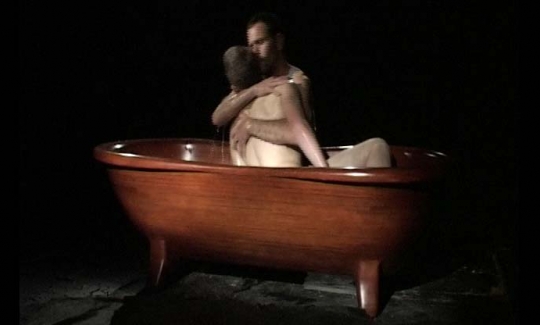Curator: Ilana Tenenbaum
Erez Israeli's works are characterized by representations of death and memory, which are related to bereavement and to acts of ritual sacrifice. Young male characters, which are sometimes played by the artist himself, appear in death-related contexts and evoke images associated with Christianity and Western mythology. The video installation Love Song, which was especially created for the Emergency Exit exhibition space, delves further into the reservoir of experiences and cultural associations that characterized Israeli's earlier works.
The installation Love Song is a charged arena that brings together the themes of homoerotic love, intimacy and murder - all described by expressive means identified with "kitsch." The elongated exhibition space contains an eye-catching projection of a rose, which opens to reveal an abundance of petals radiating a strong red light.
This intentionally excessive ready-made image (which is used in cinematic editing) amplifies the effect of the large projection in the interior space, which features two men: one is the artist himself, devotedly washing a young man who appears to be unconscious or dying. The scene was filmed using a circular camera motion, and it is accompanied by a romantic, melancholic soundtrack. At the film's climactic moment, just as Israeli suddenly submerges the man's head in the wooden bathtub, the camera freezes and the flower closes; the movement of eros and of desire is arrested with the advent of death.
The world of images and meanings imbued in this work calls to mind various cultural associations: a Baroque painting in the style of Caravaggio; the murder in the bath scene in Jacques Louis David's painting The Death of Marat (1793); Pietà images suffused with themes of sacrifice, eroticism and sanctity; a theatrical-literary scene in the style of Jean Genet, which combines a dark, decadent charm with homosexual eroticism; expressive horror films that herald a momentous event; a nostalgic romanticism related to the popular song playing in the background; and representations of kitsch and camp that tie together desire and death with exaggerated expressive means, which are suffused with a colorful, seductive aesthetic.
Erez Israeli has frequently addressed processes of commemoration and symbols of bereavement with a gaze that is at once ironic and harrowing. Especially well known are the video works in which he photographed himself with his mother in a manner alluding to the Sacrifice of Isaac, the Christian Pietà and the cruelty of self-sacrifice. In Love Song, Israeli exchanges the relationship between mother and son for a relationship between two men. This fragile relationship is suffused with warmth and care, which are conflated with their terrifying opposite. The young man's body is presented as an offering that ties together sanctity and death, love and sacrifice, Eros and Thanatos. This work operates on a number of levels; it reflects this psychological duality as it addresses various cultural representations, and echoes the relations between intimacy and sacrifice that have shaped Israeli's earlier works.

